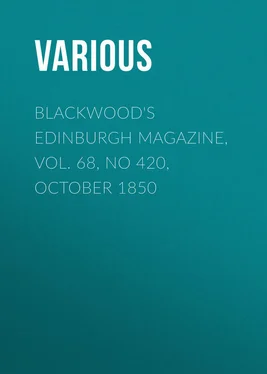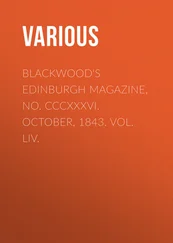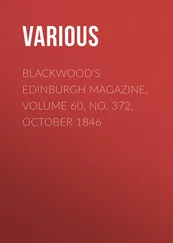Various - Blackwood's Edinburgh Magazine, Vol. 68, No 420, October 1850
Здесь есть возможность читать онлайн «Various - Blackwood's Edinburgh Magazine, Vol. 68, No 420, October 1850» — ознакомительный отрывок электронной книги совершенно бесплатно, а после прочтения отрывка купить полную версию. В некоторых случаях можно слушать аудио, скачать через торрент в формате fb2 и присутствует краткое содержание. Издательство: Иностранный паблик, Жанр: periodic, foreign_edu, Путешествия и география, на английском языке. Описание произведения, (предисловие) а так же отзывы посетителей доступны на портале библиотеки ЛибКат.
- Название:Blackwood's Edinburgh Magazine, Vol. 68, No 420, October 1850
- Автор:
- Издательство:Иностранный паблик
- Жанр:
- Год:неизвестен
- ISBN:нет данных
- Рейтинг книги:4 / 5. Голосов: 1
-
Избранное:Добавить в избранное
- Отзывы:
-
Ваша оценка:
- 80
- 1
- 2
- 3
- 4
- 5
Blackwood's Edinburgh Magazine, Vol. 68, No 420, October 1850: краткое содержание, описание и аннотация
Предлагаем к чтению аннотацию, описание, краткое содержание или предисловие (зависит от того, что написал сам автор книги «Blackwood's Edinburgh Magazine, Vol. 68, No 420, October 1850»). Если вы не нашли необходимую информацию о книге — напишите в комментариях, мы постараемся отыскать её.
Blackwood's Edinburgh Magazine, Vol. 68, No 420, October 1850 — читать онлайн ознакомительный отрывок
Ниже представлен текст книги, разбитый по страницам. Система сохранения места последней прочитанной страницы, позволяет с удобством читать онлайн бесплатно книгу «Blackwood's Edinburgh Magazine, Vol. 68, No 420, October 1850», без необходимости каждый раз заново искать на чём Вы остановились. Поставьте закладку, и сможете в любой момент перейти на страницу, на которой закончили чтение.
Интервал:
Закладка:
It is time now to direct attention to the last work of Mr Townsend – which he barely lived to see published – his Modern State Trials , spread over two goodly octavo volumes, containing nearly eleven hundred pages, and these, too, pretty closely printed. Upon this work much thought and labour have evidently been bestowed in the collection of his materials, and dealing with them, as in the volumes before us, in such a manner as to render the product at once interesting and instructive to both general and professional readers.
It is no slight matter to make one's-self thoroughly master of a great case, in all its bearings; to seize its true governing characteristics; to select, condense, and arrange facts and incidents; to assign to every actor, whether judge, jury, witness, or counsel, his proper proportion and position; and all this with a view to interesting and instructing widely different classes of readers – and those, again, general and professional. To do all this effectually, requires powerful talents, much knowledge of life and character, practical acquaintance with the law of the country, a sound judgment, and a vivid imagination. There is scarcely any point of view in which a great trial will not appear deeply interesting to a competent observer, watching how each individual plays his part in the agitating drama. Whether the judge holds the sacred scales even; whether he sees clearly and acts promptly, calmly, resolutely, in detecting fallacy, in order to shield an unsophisticated jury from its subtle and deleterious agency; whether, for this purpose, his intellect and his knowledge are superior, equal, or inferior to those of the advocates pleading before him. How those advocates conduct themselves, intellectually and morally; whether they be clear-headed, acute, ready, learned – or cloudy, obtuse, superficial, and ignorant; whether evenly or over matched; whether they play the gentleman or the scoundrel; whether they will, however difficult the task, nobly recognise the obligations of truth and honour, or villanously disregard them, to secure a paltry triumph in defeating justice! How the witnesses discharge their momentous duties; whether constantly mindful of their oath, or forgetful of it, or wilfully disregarding it, from hostility or partiality to the prisoner, or any other wicked motive. Whether the judge, or the advocates, are equal to the discomfiture of a wicked witness. How the jury are conducting themselves – whether with watchful intelligence, or stolid listlessness. How the prisoner, standing in the midst of all these – with life, with honour, character, liberty, everything at stake – and depending on the word which one of that jury will utter – how he is demeaning himself, knowing, as he does, the truth or falsehood of the charge on which he is being tried; what he is thinking of the exertions of his counsel, of the temper and spirit of the witnesses, of the jury, of the judge; whether he adverts at all to the spectators around him, and the feelings by which they are animated towards him; whether he is aware of, or appreciates, the true strain and pressure of the case – the sudden chances and perils occurring in its progress.
How striking and instructive to observe the abstract rules of justice brought to bear, with equal readiness and precision, upon ordinary and extraordinary combinations of circumstances! – to witness the dead letter of the law become animated with potent vitality for the regulation of human affairs!
Again, it has often occurred to us that there is another point of view from which important trials – nay, almost any trial – may be contemplated with lively interest by a logical observer, with reference to the use made of facts by judicial and forensic intellect. How little even the acutest layman could have anticipated such dealing with facts as that which he here beholds; how he must appreciate the practised, watchful art with which the slightest circumstance is seized hold of, and in due time so combined with others with which it seemed to have no conceivable connexion, as to justify conclusions exactly the reverse of those which had till then seemed inevitable! What totally different aspects the same facts may be made to wear by different dealers with them, having different objects in view! By their different arrangement and combination, what unexpected inferences may be drawn from the self-same facts, and even when similarly arranged and combined! How exciting to see a defence constructed by experienced astuteness and eloquence out of the slightest materials – out of a hopeless case – in the teeth of one overpowering for the prosecution! The desperate determination, the exquisite subtlety, the consummate judgment, often exhibited on such occasions by eminent advocates – struggling, too, at once with their own sense of right and wrong, and the desire to do their utmost for one who has intrusted his all to them – conscious, too, that though a jury of twelve plain common-sense people may be unable to see through the fallacies which are presented to them, it will doubtless be very far otherwise with one who has to follow, who has the last word! and with that last word may at once lay bare the sophistries of forensic effrontery, and perhaps rebuke him who attempted to trifle with and mislead the understandings of those so solemnly sworn to give a just and true verdict according to the evidence. "But what is one to do?" exclaims the anxious advocate. "How am I to defend yonder trembling being who has selected me to stand between him and – the scaffold, it may be – if I am to play the judge, and not the advocate; to yield pusillanimously to an array of fearfully plain facts, and make no attempt to square them with the hypothesis of my client's innocence, or persuade a jury that they are – whatever my own secret opinion – pregnant with too much doubt to warrant a verdict of guilty?" Only one who has been placed in the situation can conceive the faintest idea of what is endured on such occasions by the sensitive and conscientious advocate, who is called upon in desperate emergencies – in moments of intense eagerness and anxiety – the spasms, as it were, of which are publicly exhibited, and before gifted and critical rivals and merciless public censors, to see and observe the delicate but decisive line of right – of duty; to maintain at once the character of the zealous, effective advocate, and the Christian gentleman. If sufficient allowances were made for persons placed in such circumstances of serious embarrassment and responsibility, less uncharitable judgments would be passed on the manner in which advocates exercise their functions than are sometimes seen; judgments formed and pronounced, too, in the closet – by those speaking after the event – calm and undisturbed by anxieties and agitation, which have probably never been personally experienced . This topic, however, we shall hereafter treat more at large, in giving to the volumes before us that extended examination which is at present contemplated. They contain a series of trials of undoubted public interest and importance. They have been selected upon the whole judiciously, with a view to the end which the author had proposed to himself; though the propriety of the title which he has chosen — i. e. "Modern State Trials" – is not at first sight apparent. The idea conveyed by these words is, trials directly affecting the state , political prosecutions in respect of political offences. It is difficult to bring trials for murder, duelling, forgery, abduction, libel, blasphemy, and conspiracy, under this category; and this Mr Townsend felt. Such, nevertheless, constitute a large proportion of the trials contained in these volumes, and are, in our opinion, also those of most popular interest, and worthiest of being dealt with, as it was Mr Townsend's expressed intention to deal with them.
Читать дальшеИнтервал:
Закладка:
Похожие книги на «Blackwood's Edinburgh Magazine, Vol. 68, No 420, October 1850»
Представляем Вашему вниманию похожие книги на «Blackwood's Edinburgh Magazine, Vol. 68, No 420, October 1850» списком для выбора. Мы отобрали схожую по названию и смыслу литературу в надежде предоставить читателям больше вариантов отыскать новые, интересные, ещё непрочитанные произведения.
Обсуждение, отзывы о книге «Blackwood's Edinburgh Magazine, Vol. 68, No 420, October 1850» и просто собственные мнения читателей. Оставьте ваши комментарии, напишите, что Вы думаете о произведении, его смысле или главных героях. Укажите что конкретно понравилось, а что нет, и почему Вы так считаете.












